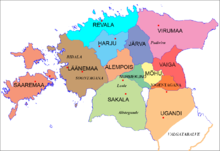Revala
Estonian
[edit]
Alternative forms
[edit]Etymology
[edit]Estonian linguist Gustav Must theorized, that the toponym is related to rebane (“fox”) and suffixed with a toponym-forming suffix -la.[1]
Latvian historian Nicolaus Busch connected the toponym to Old Norse rif (“reef”) (compare Danish rev and Swedish ref), hypothesizing that it got its name due to being located near the Northern Estonian coastal cliffs. If so, the term was later expanded with a German diminutive suffix -el.
Swedish priest Per Wieselgren called Busch's theory a Scandinavian folk etymology, and instead connected the toponym with räbal (“tatter, rags”) and riba (“strip”).[2]
In any case, the toponym got borrowed into German, whence it was reborrowed back into Estonian literary language in this form. Note that the toponym likely never existed in actual Estonian usage and was only used in written documents, as such written by German nobility.
The Hanseatic name for Tallinn, German Reval, Russian Ревель (Revelʹ), Finnish Rääveli etc., is derived from the name of the county.
Pronunciation
[edit]Proper noun
[edit]Revala (genitive Revala, partitive Revalat)
- an ancient Estonian county located in the vicinity of modern-day Tallinn
Declension
[edit]| Declension of Revala (ÕS type 1/ohutu, no gradation) | |||
|---|---|---|---|
| singular | plural | ||
| nominative | Revala | — | |
| accusative | nom. | ||
| gen. | Revala | ||
| genitive | — | ||
| partitive | Revalat | — | |
| illative | Revalasse | — | |
| inessive | Revalas | — | |
| elative | Revalast | — | |
| allative | Revalale | — | |
| adessive | Revalal | — | |
| ablative | Revalalt | — | |
| translative | Revalaks | — | |
| terminative | Revalani | — | |
| essive | Revalana | — | |
| abessive | Revalata | — | |
| comitative | Revalaga | — | |
References
[edit]Further reading
[edit]- “Revala”, in [KNR] Eesti kohanimeraamat [Book of Estonian Toponyms] (in Estonian) (online version, occasionally updated), Tallinn: Eesti Keele Sihtasutus (Estonian Language Foundation), 2017–

